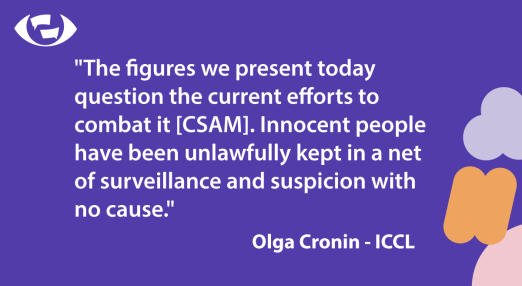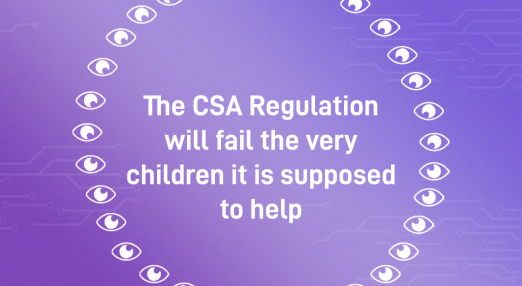Mid-point EDRi strategy review: impact and adjustments in a changing field
In April 2020, during the early months of the Covid-19 pandemic in Europe, EDRi adopted its first network multi-annual strategy for the years 2020-2024. At the mid-term of the strategy implementation, what have we learned?
Filter resources
-

Mid-point EDRi strategy review: impact and adjustments in a changing field
In April 2020, during the early months of the Covid-19 pandemic in Europe, EDRi adopted its first network multi-annual strategy for the years 2020-2024. At the mid-term of the strategy implementation, what have we learned?
Read more
-

Activists v. Poland. European Court of Human Rights hearing on uncontrolled surveillance
On 27 September, the hearing was held at the European Court of Human Rights, following the application against Poland lodged by activists from Poland’s Panoptykon Foundation and Helsinki Foundation for Human Rights, joined by a human rights attorney.
Read more
-

Europol is going to collect a massive collection of intimate conversations from European youngsters
This story begins with the creation of a new European agency, but ends with one of the world's largest databases of private chats and images shared by European youngsters—built by the police.
Read more
-

PEGA hearing about spyware and ePrivacy
Following the public revelations of the widespread use of Pegasus and other spyware, the European Parliament formed the Committee of Inquiry to investigate the use of Pegasus and equivalent surveillance spyware (PEGA) in March 2022.
Read more
-

Chat Control – A good day for privacy
The Austrian parliament voted in its EU committee to adopt a resolution that has a binding effect on the position of the Austrian government not to agree to the proposal for the controversial child sexual abuse regulation, if it is not brought in line with fundamental rights.
Read more
-

Position Paper: State access to encrypted data
EDRi’s new policy paper on encryption highlights that our privacy and security must be strongly protected, keeping into account the recent policy developments on encryption and law enforcement. Trust in communication systems is vital for our lives and connections with others. This allows us to work, socialise, organise, express ourselves, and care for each other safely.
Read more
-

Position paper: A safe internet for all – Upholding private and secure communications
Despite the importance of its goals, the European Union’s proposed Child Sexual Abuse Regulation (CSAR) will not only fail in its aims to protect young people, but it will also even harm those it wants to protect.
Read more
-

News from Ireland question effectiveness and lawfulness of online scanning for tackling child sexual abuse: Lessons for the EU
An investigation in Ireland published today shows that tools for scanning private communications to detect child sexual abuse material (CSAM) online suffer not only from low accuracy and high rates of false alarms but have led to people’s data and privacy being put in danger without reasonable suspicion.
Read more
-

Johansson’s address to MEPs shows why the CSA law will fail the children meant to benefit from it
On 10 October 2022, EU Commissioner for Home Affairs, Ylva Johansson, addresses the European Parliament’s Civil Liberties (LIBE) Committee about the proposed EU Child Sexual Abuse Regulation (2022/0155). The address follows months of criticism from civil liberties groups, data protection authorities and even governments due to the risks it poses to everyone’s privacy, security and free expression online.
Read more
-

Securing privacy: Privacy International on end-to-end encryption
EDRi member Privacy International's (PI) report on end-to-end encryption (E2EE) analyses and defends expanding the use of E2EE to protect our communications. It defines E2EE, delves into its human rights implications, briefly addresses some prominent proposals for government access to E2EE content, and concludes with PI’s recommendations regarding E2EE.
Read more
-

United Nations report voices digital rights groups’ concerns over encryption in EU’s new rules
On 16 November 2022, the United Nations Human Rights Office published a report on the right to privacy in the digital age warning against the European Union’s plans to undermine encryption and the threat of mass surveillance in the proposed chat control legislation.
Read more
-

Foreign authorities are banning Google and Microsoft services from schools, the Czech Republic is floundering
Jan Cibulka, a journalist for iROZHLAS and member of the Big Brother Awards CZ Jury, organised by EDRi member Iuridicum Remedium, has investigated how Czech authorities and schools are approaching the protection of privacy when using distance learning tools. Such tools send sensitive information overseas, where US law gives intelligence agencies access to it. The tools do not guarantee that children's private chats will not be accessed by, for example, teachers. While the first regional governments in Europe are developing safer alternatives, in the Czech Republic the risk assessment remains up to individual schools. In practice, they have little choice.
Read more
